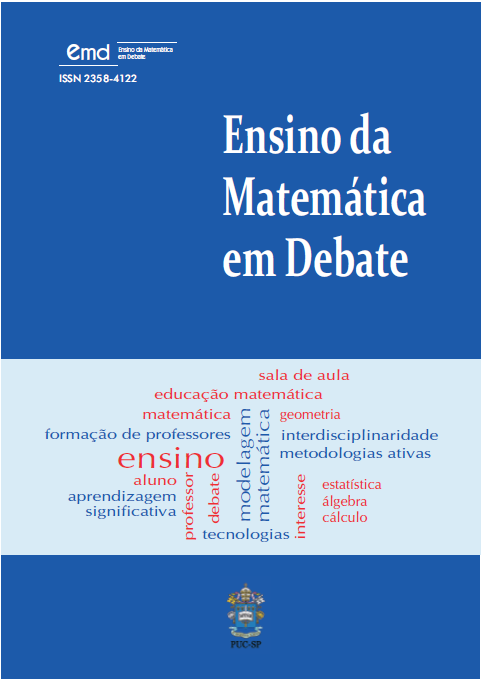The Maker Culture in the context of Mathematical Modeling: a systematic literature review
Keywords:
Mathematical modeling, Maker Culture, MathematicsAbstract
The aim of this paper is to present a Systematic Literature Review (SLR) of studies that address the use of maker culture for teaching mathematics in mathematical modeling activities. For this, we used studies and research extracted from the database of Capes, Google Scholar, Scielo, ACM Digital, ERIC and Science Direct in the last five years, in order to quantify and analyze the works that addressed the use of modeling as a guiding methodology of practice maker. According to the results obtained, it was found that, although mathematical modeling has not yet been used effectively as a guiding methodology for the maker practice, its requests were identified in 80% of the studies intertwined in this RSL, allowing us to infer that there is a convergence methodological between both potentially relevant to the process of teaching mathematics. In this RSL, a mapping of the methodologies used in maker activities was also carried out, in which it was found that Project-Based Learning (PBL) is the methodology that most integrates projects related to the maker culture.
References
ALVES Aleixo, A., SILVA, B., & Silva Ramos, M. A. Análisis del uso de la cultura maker en contextos educativos: Una revisión sistemática de la literatura. Education Siglo XXI, 39(2), 143–168. 2021. https://doi.org/10.6018/educatio.465991
ANDERSON, C. Makers: A Nova Revolução Industrial. Tradução: Afonso Celso da Cunha Serra, Rio de Janeiro: Elsevier, 2012.
BARBOSA, J , C.Teacher-student interations in mathematical modelling. In: HAINES, C.; GALBRAITH, P; BLUM, W; KHAN, S. (Org.). Mathematical Modelling: education, engineering and economics. 1 ed. Chichester: Horwood Publishing, v. único, p. 232-240, 2006.
BENDER, W. Aprendizagem baseada em projetos: educação diferenciada para o século XXI. Porto Alegre: Penso, 2014.
BIEMBENGUT, M. S.; HEIN, N. Modelagem Matemática no ensino. São Paulo: Contexto, 2003.
BIEMBENGUT, M. S. Modelagem na educação matemática e na ciência. São Paulo: Editora Livraria da Física, 2016.
BLIKSTEIN, P. Digital fabrication and “making” in education: the democratization of invention. In: WALTER-HERRMANN, Julia; BÜCHING, Corinne (ed.). FabLabs: of machines, makers and inventors. Bielefeld: Transcript Publishers, p. 203-221, 2013.
BRASIL. Base Nacional Comum Curricular (BNCC). Brasília: MEC/SEF, 2018.
BROCKVELD, M. V. V.; SILVA, M. R ; TEIXEIRA, C. S. A Cultura Maker em Prol da Inovação nos Sistemas Educacionais, p. 55 -66. In: Educação Fora da Caixa: Tendências Internacionais e Perspectivas sobre a Inovação na Educação. São Paulo: Blucher, 2018.
BURAK, D. Modelagem Matemática: ações e interações no processo de ensino-aprendizagem. Tese de Doutorado, FE/UNICAMP. Campinas, 1992.
BURAK, D. A Modelagem Matemática e a sala de aula. In: IEPMEM – I Encontro Paranaense de Modelagem em Educação Matemática, 2004.
BURAK, D. Modelagem Matemática sob um olhar de Educação Matemática e suas implicações para a construção do conhecimento matemático em sala de aula. Revista de Modelagem na Educação Matemática, Blumenau, v. 1, n. 1, p. 10-27, 2010.
BURAK,D.; ARAGÃO, R. M.de. A modelagem matemática e relações com a aprendizagem significativa. Curitiba: Editora CRV, 2012.
D'AMBROSIO, U. Educação Matemática: da teoria à prática. 17. Campinas: Papirus, 2009.
KITCHENHAM, B.; CHARTERS, S. Guidelines for performing systematic literature reviews In. KLÜBER, T. E; BURAK, D. Concepções de modelagem matemática: contribuições teóricas. Educação Matemática Pesquisa, v. 10, n. 1, 2008. software engineering. 2007.
MARTINEZ, S; STAGER, G. Invent to learn: making , tinkering and engineering in the classroom. Torrance: Constructing Modern Knowledge Press, 2013.
MORAN, J.; BACICH, L. Metodologias ativas para uma educação inovadora: uma abordagem téorico-prática. Porto Alegre: Penso, 2018.
NISS, M. Modelagem prescritiva: Desafios e oportunidades. Em GA Stillman, W. Blum, & MS. Biembegut (Eds.), Modelagem matemática em pesquisa e prática em educação: influências culturais,sociais e cognitivas (p.67-69). Heidelberg, Alemanha: Springer, 2015.
PAPERT, S. Mindstorms: children, computers and powerful ideas . New York: Basic Books, 1980.
PAULA, B. B. de; MARTINS, C. B.; OLIVEIRA, T. de. Análise da crescente influência da Cultura Maker na Educação: Revisão Sistemática da Literatura no Brasil . Educitec - Revista de Estudos e Pesquisas sobre Ensino Tecnológico, Manaus, Brasil, v. 7, p. e134921, 2021. DOI: 10.31417/educitec.v7.1349. Disponível em: https://sistemascmc.ifam.edu.br/educitec/index.php/educitec/article/view/1349
SANTOS, D. A. dos .; FONSECA, L. C. C. .; PINTO, M. S. S. .; RIBEIRO, F. A. A. Use of maker culture in the educational context: Systematic literature review . Research, Society and Development, [S. l.], v. 11, n. 6, p. e40611629159, 2022. DOI: 10.33448/rsd-v11i6.29159. Disponível em: https://rsdjournal.org/index.php/rsd/article/view/29159. Acesso em: 5 oct. 2022.
SOSTER, T., ALMEIDA, F, & MOREIRA S., M. Educação Maker e Compromisso Ético na Sociedade Da Cultura Digital. Revista E-Curriculum, 18(2), 715–738, 2020. https://doi.org/10.23925/1809-3876.2020v18i2p715-738.
Downloads
Published
How to Cite
Issue
Section
License
Copyright (c) 2024 Ensino da Matemática em Debate

This work is licensed under a Creative Commons Attribution-NonCommercial 4.0 International License.

Este obra está licenciado com uma Licença Creative Commons Atribuição 4.0 Internacional.






